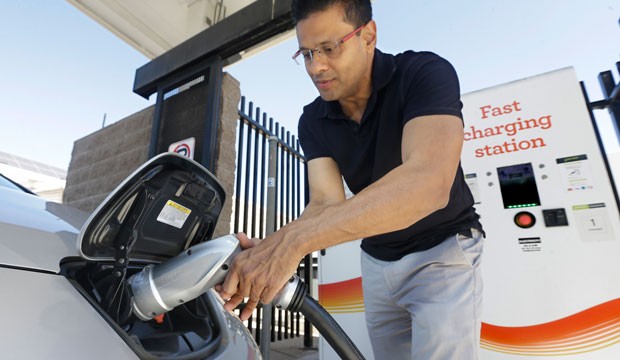Darshan Brahmbhatt plugs a charger into his electric vehicle at the Sacramento Municipal Utility District charging station in Sacramento, California, on September 17, 2015. Source: AP/Rich Pedroncelli
Washington, D.C. —(ENEWSPF)–April 22, 2016. The transportation sector accounts for more than one-quarter of all greenhouse gas emissions in the United States, and gasoline powered cars and light-duty trucks are the biggest contributors. As the United States continues to stride toward meeting its climate goals, deployment of zero-emission electric vehicles will be an important component. As the provider of the fuel for electric vehicles, or EVs, electric utilities can benefit from putting more electric vehicles on the road.
The Center for American Progress has released a report offering recommendations on how electric utilities can contribute to the affordability and adoption of electric vehicles.
“The advancement of electric vehicle technology is making widespread adoption of EVs compatible with the market,” said Myriam Alexander Kearns, Research Associate and co-author of the report. “This will undoubtedly affect electric utility companies as more and more people choose to bypass the pump and instead plug in their cars. Utility companies have an opportunity to use their current presence in nearly every home and business in the country to incentivize EV ownership, particularly for low-income and underserved areas. This will bring the United States closer to meeting its goals to reduce greenhouse gas emissions.”
CAP recommends that electric utilities:
- Starting with pilot programs, invest in a public charging infrastructure in their service areas to complement the private sector’s investment in this area.
- Offer cheaper time-of-use rates to encourage electric vehicle owners to charge during low-demand times, and identify ways to offer electric vehicle owners electricity generated from renewable or zero-carbon energy sources.
- Expand charging access to low-income areas and multifamily residences, and encourage state policymakers to offer point-of-sale rebates for residents in these areas to make the cars a more affordable option.
Click here to read the report.
Source: http://www.americanprogress.org









